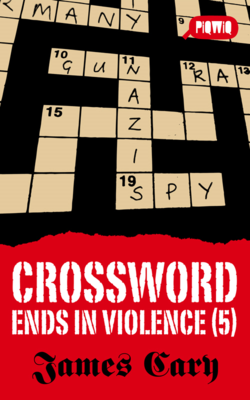
This entertaining comedy thriller is (unfortunately for some of you) only available as an e-book. James Cary, the author, has described himself as 'a over-educated thirtysomething male who is slightly obsessed with the second world war'. He has won awards for his BBC comedy writing, which includes the successful series Hut 33. This is (I think) his first venture into fiction.
The plot is somewhat complex, as it whizzes back and forth between several time-frames -- the present day, eight years after the war, and 1944. The main character is John Fellowes, a crossword compiler, who, in between his obssessive need to invent clues for every unusual word he encounters, is trying to find out the truth about his grandfather, who seems to have been involved in the crossword clues which gave, or could have given, information to the Nazis about the forthcoming D-Day landings. With me so far?
John has been shocked by the revelation that his grandfather might have been a Nazi spy, and sets out to prove that he was not. In this he is helped by his two colleagues Turner, a highly intelligent but embittered chess grandmaster and Overend, a brilliant but eccentric nerd, and by the lovely Amanda, an accountant from downstairs. All the characters are great -- a bunch of boffins, sure, but it's fun watching their minds work.
I have a good friend who is a crossword lover and occasional compiler, and I was constantly reminded of him by John, and by the many cryptic clues that are dotted through the text. In fact the whole book is structured like a crossword, with the modern chapters headed Across and the historic ones Down. I'm pretty hopeless about solving clues, though I can immediately understand the solutions once they are pointed out to me. But if you are the same, don't let that stop you reading this ingenious and entertaining novel. All will be finally revealed, I promise you. And of course if you happen to be a crossword buff, you will be in heaven.
The Guardian did an interview with James Cary about the novel and all things crossword, which you can read here. In it he points out, among other things, that
in the second world war – perhaps like no other before – boffins, linguists and general smart-arses could be put to good use, thinking creatively and laterally as well as scientifically.
True -- and fascinating.
Thanks to the publisher for sending me this copy.
